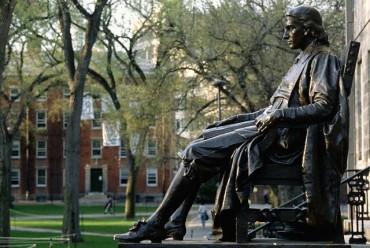
Freedom of speech and critical examination of new ideas should be a staple of the American university – but Harvard’s Kennedy School of Government didn’t get it quite right at its recent One State Conference, which focused on solving the Israeli-Palestinian conflict with the creation of one democratic state for Palestinians and Israelis (in which Jews would be the minority), a move that would bring about the end of the Jewish state of Israel as we know it.
The stated goal of the conference was “to educate ourselves and others about the possible contours of a one-state solution and the challenges that stand in the way of its realization,” which sounds like a perfectly reasonable topic for academic discussion. But with a plethora of anti-Israel speakers on hand (Ilan Pappe, Diana Buttu, Susan Akram and Ali Abunimah) and nobody representing an alternative viewpoint, the conference was weak on critical examination – and strong on demonizing Israel.
Even Harvard Kennedy School Dean David Ellwood issued a statement in advance, distancing his school from the conference and expressing disappointment with the one-sided nature of the invited speakers. “Without the balance of divergent views that characterize the most enriching discussions, the credibility and intellectual value of any event is open to question,” Ellwood explained.
And he was not alone. Massachusetts Senator Scott Brown also issued a statement, condemning the conference and requesting that Harvard cancel it, due to “dangerous thinking that gives comfort to Israel’s enemies… Harvard has a right to do it, but that doesn’t make it right to do it.”
Despite all this, the conference was still funded in part by the Office of the Provost of Harvard University and the Weatherhead Center for International Affairs.
Other voices with legitimate points could have been heard at the conference. Harvard professor Alan Dershowitz states in the Harvard Crimson, “Many of the speakers at the current conference will argue against ‘a Jewish state,’ without protesting the Palestinian Constitution that formally establishes the Islamic religion as the only ‘official’ faith and ‘the principles of Islamic Sharia’ as the main source of law…” Indeed – why not allow these types of questions to be asked, for the most “enriching discussions of intellectual value,” to paraphrase Dean Ellwood?
Instead, inflammatory anti-Israel rhetoric was the order of the day. Professor Susan Akram went so far as to say that the Jewish people do not exist and that there is no legal basis whatsoever for Jewish self-determination. Akram states, “the concept of the Jewish people as a national entity with extraterritorial claims has never been recognized under international law” (of course, adhering to this argument would require accepting that international law actually means something which, as demonstrated by Iran and Syria today, is not necessarily the case).
Other speakers ignored thousands of years of violence against Jews in the Middle East (and the oft-stated claims of Islamic supremacy as Dershowitz points out). Sa’ed Atshan opined that this new country in which Jews and Arabs would live with a Jewish minority would include a diverse culture featuring equal rights (which Arab-Israelis have in Israel), joint Arab-Jewish police forces (which already exist in Israel) and that Arabic and Hebrew would both be taught (again, this already occurs in Israel).
Sounds like we already have the workings of a one state solution. But of course, as many speakers seemed to concur, it is in fact the Jewishness of Israel, or as Simmons College Professor Elaine Hagopian explained, their “European style of life” and their “colonialist principles” that are the problem. Naturally, becoming “un-Jewish” is the first step to reconciliation with the Palestinians, according to Jewish professor Marc Ellis.
It was an ironic spectacle: Speakers insisting their right to speak is being hindered, at a conference where theirs were the only voices allowed. Ali Abunimah, one of the keynote speakers, began by discussing how Palestinian activists are victimized, and how many attempts there have been to hinder their freedom of speech – again, during remarks delivered prominently at, and sponsored by, America’s premier university.
Abunimah, in arguing that “partition is out of fashion” (he says it can lead to ethnic cleansing), also stated that the idea that Israel can exist as a Jewish state cannot be defended “politically, ethically, or legally.” A controversial viewpoint no doubt, and one which he was able to share unfettered in any way, even while claiming that pro-Israel organizations, such as The David Project, want to prevent people like him from talking about these issues on campus.
Phillip Brodsky, Campus Team Manager for The David Project, disagrees. He says the goal of his program is to empower “students to feel comfortable talking about Israel, to be thoughtful relationship builders on campus” and to “understand the issues for themselves.” Brodsky says, “Sometimes there are people who will fundamentally disagree with Israel’s right to exist as a democratic Jewish state,” but emphasized The David Project fully supports students having thoughtful discussions with anyone.
Speaking of thoughtful discussions – there were very few in evidence at the One State Conference, where nearly all speakers proclaimed the two-state solution to be “dead,” and implied the blame for that lies at the feet of the Israelis, who don’t want peace.
But that kind of rhetoric does nothing to persuade the Jewish people that this one-state solution is in their best interests – not when they’ve been discriminated against for centuries by people who wish to kill them, deny their right to exist, or exercise self-determination. At the very least, the serious security concerns that such a solution would introduce should have been fully addressed.
Intellectual debate can be enriching and inspiring, even if one passionately disagrees with what’s being said. That’s the beauty of free speech. And that’s what an elite university like Harvard should seek to cultivate on its campus. Unfortunately, at the Harvard One State Conference, despite the impressive credentials of the speakers, there was no such deliberation. Instead, there was simply intellectual dishonesty – the inevitable folly that results from purposefully shutting out all opposing views.
Fix Contributor Emily Schrader graduated from USC in December and will be attending IDC Herzilya in the fall.
Click here to Like The College Fix on Facebook.





Please join the conversation about our stories on Facebook, Twitter, Instagram, Reddit, MeWe, Rumble, Gab, Minds and Gettr.